The Friday Edition
Our Friday News Analysis | What the World Reads Now!
Helping to Heal a Broken Humanity (Part 18)
The Hague, 3 January 2025 | If you know of a decisive story, tell the world! We're still searching.
VIEW | THE ECONOMIST 2025: HIDDEN MESSAGES AND GLOBAL PREDICTIONS
Uncover the hidden symbols and messages in The Economist's 2025 cover. What are they predicting for the future?

Click This Link to Watch the Video (4 minutes, 40 seconds)
TOM STANDAGE’S TEN TRENDS TO WATCH IN 2025
A letter from the editor of The World Ahead

illustration: Tim Mcdonnagh
By Tom Standage, Editor
The World Ahead 2025
The Economist
18 November 2024
It seems appropriate that 2025 has been designated the year of quantum science and technology by the United Nations. Because, like Schrödinger’s cat, which (in a quantum thought experiment) was both alive and dead at the same time inside a closed box, 2025 has hovered in a superposition of two very different states, defined by the outcome of America’s election. Now the ballot boxes have been opened, the world knows which 2025 to expect: the one where Donald Trump returns to the White House. With that uncertainty resolved, here are ten themes to watch in the coming year.
The repercussions of Mr. Trump’s sweeping victory will impact various areas, including immigration, defense, economics, and trade. His “America First” policy will prompt friends and foes to question the strength of America’s alliances. This could lead to geopolitical realignments, increased tensions, and possibly nuclear proliferation.
More generally, incumbent parties performed poorly in 2024’s unprecedented wave of elections. Some were ousted (as in America and Britain); others were compelled to form coalitions (as in India and South Africa); still others were led to cohabitation (as in Taiwan and France). Thus, 2025 will be a year of expectations. Can new leaders fulfill their promises? Will humbled leaders change? If not, unrest may ensue.
Mr. Trump may push Ukraine to make a deal with Russia and give Israel a free hand in its conflicts in Gaza and Lebanon. America’s more transactional stance and skepticism of foreign entanglements will encourage troublemaking by China, Russia, Iran, and North Korea (the “quartet of chaos”) and more meddling by regional powers, like that seen in crisis-hit Sudan. However, whether America would stand up to China in a conflict over Taiwan or the South China Sea is unclear.
For now, America’s rivalry with China will manifest as a trade war as Mr. Trump imposes restrictions and ramps up tariffs—including on America’s allies. As protectionism intensifies, Chinese firms are expanding abroad to circumvent trade barriers and tap new markets in the global south. There is so much for decoupling; Chinese firms building factories from Mexico to Hungary have other plans.
2025 will be a year of expectations. Can new leaders deliver?
China’s government has encouraged booming solar panels, batteries, and electric vehicle exports to offset a weak domestic economy. The result is a Chinese-led clean-tech boom, with the adoption of solar panels and grid storage outstripping forecasts. The world will soon learn whether global emissions have peaked.
The rich world’s central bankers have celebrated the defeat of inflation. Now, Western economies face a new challenge: reducing deficits by increasing taxes, cutting spending, or boosting growth. Many may also have to increase defense budgets. Painful economic choices loom. Mr. Trump’s policies will worsen things in America: Heavily imposed import tariffs could hamper growth and reignite inflation.
America has just elected its oldest president-elect. As world leaders and populations age, expect more discussions on age limits for political leaders. China, meanwhile, is looking for economic opportunities in an aging world. In parts of the Middle East, by contrast, a booming youth population and a shortage of jobs risk instability.
It’s the biggest gamble in business history: more than $1 trillion is being spent on data centers for artificial intelligence (AI), even though companies are still uncertain about how to use it and adoption rates remain low (though many workers may simply be using it in secret). Will investors lose their nerve, or will AI prove its worth as “agentic” systems become more capable and AI-developed drugs emerge?
The global movement of people, not just goods, is encountering increasing friction. Conflict is disrupting global aviation. Europe is implementing new border checks, and its borderless Schengen system is starting to fray. While the backlash against “overtourism” may lessen in 2025, the restrictions imposed by many cities, from Amsterdam to Venice, will likely persist.
With assassination attempts, exploding walkie-talkies, and giant rockets being captured by chopsticks, one lesson from 2024 was to expect the unbelievable. What implausible-sounding events might unfold in 2025? Our “Wild Cards" section highlights a range of possibilities to watch for, including a devastating solar storm, the discovery of lost ancient texts, and even another global pandemic.
Anticipating the unexpected can be beneficial for navigating the future. We hope you find The World Ahead 2025 a helpful guide for the upcoming year, no matter what surprises may arise.
Explore more …
This article appeared in the From the Editor section of the print edition of The World Ahead 2025 under the headline “From the Editor.”
What is the Side of the Story that is Not Yet Decisive? Edited by Abraham A. van Kempen
_________________________
EDITOR’S NOTE | 2025 – Brimming with Possibilities!
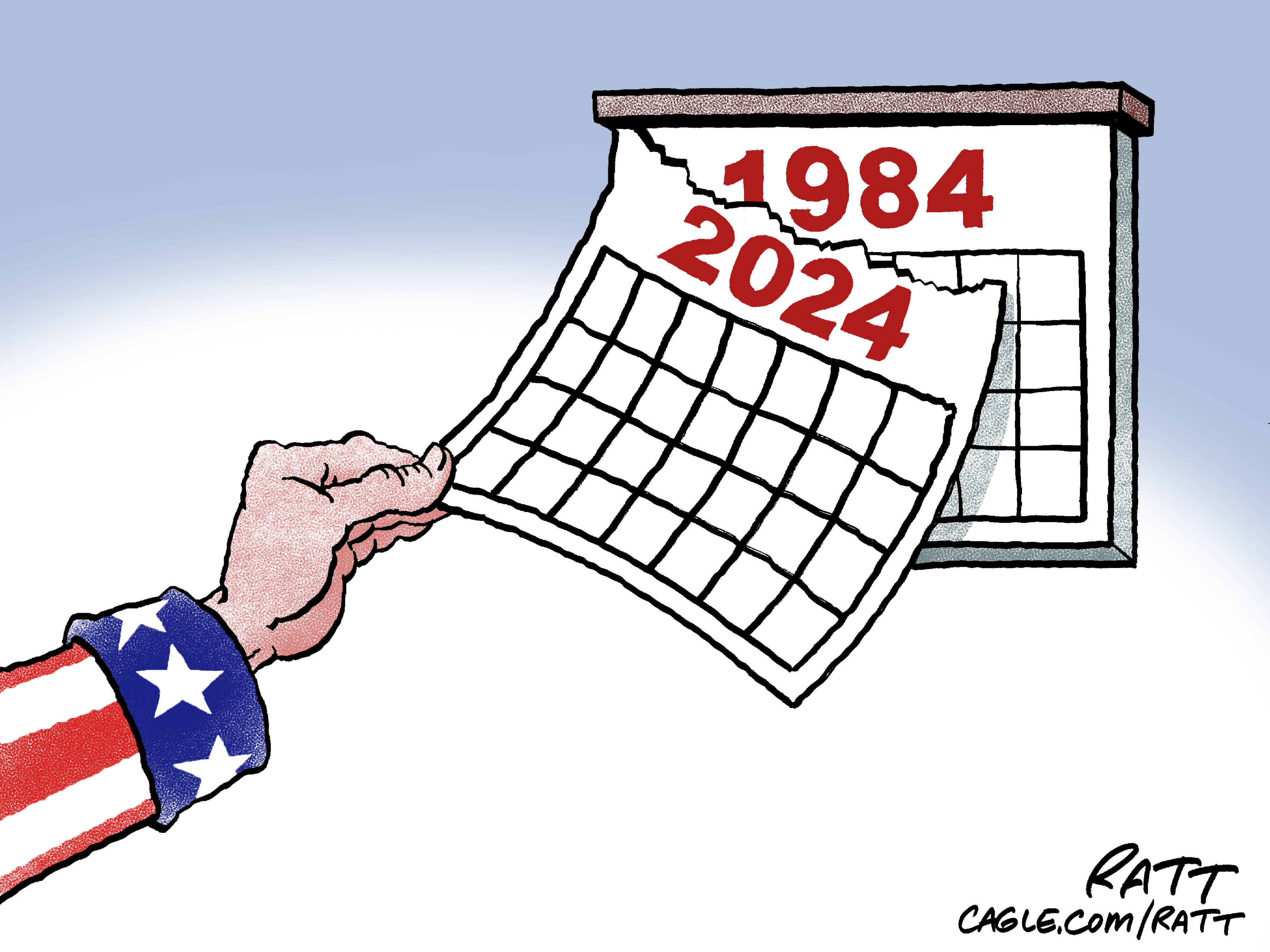
Relax! It’s neither 2024 nor 1984. It’s the beginning of a new year, 2025, brimming with renewed possibilities and emerging opportunities.
Our Global Resolutions
-
While still formidable, the West is no longer invincible. Will a multipolar world, characterized by a system of checks and balances, counter Western hegemony? Will the West enhance its role as a global neighbor and share its hegemony with the BRICS nations? Is this possibility on the horizon?
-
If left to their own devices – NATO, GO HOME – will Ukraine and the Russian Federation become better neighbors, inevitably following a regime change in Kyiv?
-
To survive as a small entity—a mere speck of dirt—in the Middle East among 400 million neighbors, will Israel stop shooting itself in both feet until it has no feet left?
-
Will Americans in the United States, currently more divided than united, learn to coexist and collaborate, becoming better neighbors both at home and abroad?
-
Will Europe, America, Africa, China, Russia, Iran, and every nation on Earth stop fearing each other as enemies? Time is running out. The world is much smaller now. We are all neighbors living under the same sun and moon, breathing the same air.
_____________________
COMMENTARY | IN IDEOLOGY, DIVERSITY IS STRENGTH
The smiles were broad, and laughter and excitement filled the air. The large crowd, likely exceeding 20,000 at times, was diverse in age, race, and religion. There was undoubtedly a sense of joy in the atmosphere.
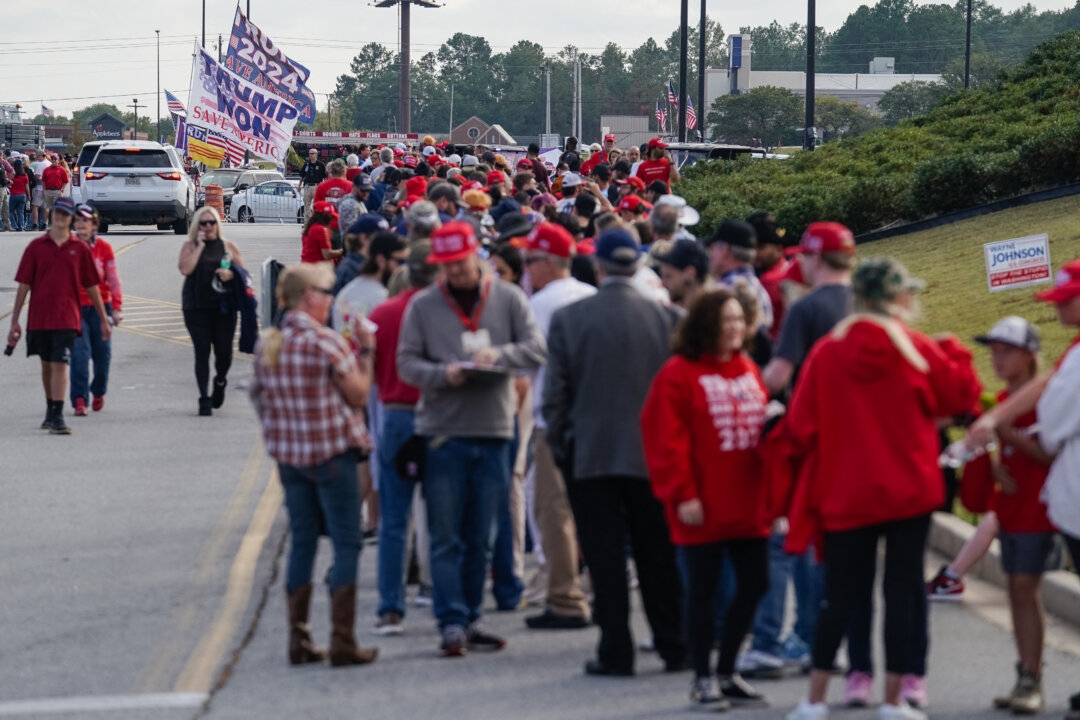
Supporters wait in line to enter a campaign rally for former President and Republican presidential candidate Donald Trump in Macon, Ga., on Nov. 3, 2024. Elijah Nouvelage/AFP via Getty Images
By Jeffrey A. Tucker
Epoch Times
1 January 2025
In the weeks before the inauguration, political reporters have sought ways to entrap the incoming administration in complex internal divisions and disagreements. The aim is to undermine unity before the significant transition, transforming MAGA/MAHA/DOGE into versions of the classic internal firing squads.
This is effective to some extent. Witnessing the heated debates surrounding H-1B visas, the priorities related to technology, and the disagreements within the health-freedom movement regarding the future of mRNA technology and vaccines in a broader context has been invigorating.
Intense fights and harsh words have erupted in recent weeks. There is no reason to be alarmed. These discussions should have occurred long ago. Disputes and debates can only strengthen social, cultural, and political movements.
All this activity took place right after I returned from Phoenix, Arizona, where I attended the AmericaFest event hosted by Turning Point USA. Over the decades, I’ve been to various ideological, political, and philosophical gatherings, many of which were quite large and well-organized. I want to express clearly that I’ve never experienced an event like this one before.
The energy radiating from the wildly enthusiastic attendees was palpable and markedly different from what emanates from just loud music and bright lights. Each exhibitor space seemed to resonate with the enthusiasm of the attendees themselves.
RELATED STORIES
The Economics of ‘It’s a Wonderful Life’
25 December 2024

Preference Falsification and Cascade
21 December 2024

The smiles were broad, and laughter and excitement filled the air. The large crowd, likely exceeding 20,000 at times, was diverse in age, race, and religion. There was undoubtedly a sense of joy in the atmosphere. I could feel it as I stepped onto the stage to speak.
On Saturday evening, I went to bed at 10:30 p.m. to ensure a good night’s sleep and prepare for my flight the following day. At 3:00 a.m., I was awakened by shouts of “U-S-A” and cheers from outside. I looked out the window to see what was happening and noticed large crowds and lines gathering, clearly because Trump was scheduled to speak the next day at noon at the venue just two blocks away.
Amazed that things could already be going so strong—thousands were foregoing a night of sleep—I tried to get more rest, but that proved impossible. At 4:30 a.m., I realized I needed to call an Uber to the airport before the streets became impassable. By the time I left, the lines had wound back and forth three and four times—again, two blocks from the venue.
I observed people enjoying themselves, meeting new acquaintances, forming friendships, sharing information and news, and offering brief bios of their lives and aspirations. I realized something that seems obvious to me now but wasn't clear before: the Trump lines have evolved into a significant source of social and cultural organization in their own right.
There is a theory that the anti-Soviet revolution of 1989–90 and the overthrow of the communist government, which had been in power since 1918, stemmed from the bread lines. These lines developed into communities where people gathered, gossiped, and shared updates about their lives and experiences. In these lines, strangers became friends and exchanged opinions on the day’s news. Here, they discovered whom to trust and distrust, laying the foundation for the revolution.
I now understand how this can happen and why people wait in line for 12 hours or more to see Trump speak before he takes the stage. While Trump may be the focal point, the real value people gain from this experience comes from meeting others, debating ideas, forming friendships, sharing experiences, and witnessing the gradual transformation of isolation into community.
This is the value of these in-person meetings, which any online chatter cannot replicate. As I observed it all unfold, I contemplated the typical reporter for a major mainstream newspaper and what they must consider regarding the immense strength and cultural influence demonstrated at these rallies. I briefly discussed this with a CNN cameraman who was in awe of the energy, joy, and hope present. We both agreed: there has never been anything like this.
The combination of MAGA, MAHA, and DOGE is undoubtedly one of the most remarkable political coalitions ever formed in such a short time. It united individuals who previously had no idea they shared much in common, making them realize that they may have overlooked aspects of other groups that deserve examination.
Consider the social and political divides that this coalition has helped to bridge. The tech enthusiasts seem to have little in common with the patriotic, flag-waving supporters of the MAGA base. Meanwhile, the crunchy, whole-food consumers of organic produce who emerged in the 1990s have consistently voted for the left and remain deeply skeptical of bourgeois religious fervor and high-tech innovations.
In just a few weeks, the divisions between these groups melted away as they recognized their shared interest in freedom: free enterprise, free speech, freedom of religion, and global peace. This unity has created significant opportunities for exchanging views and learning from one another, almost as if the private salons many of us established during lockdowns had gone public and evolved into a mass movement.
A historian of society will handle this far more effectively than I can, but we can already discern the outlines of the narrative. It is an impressive one, far too important to be eclipsed by online debates about H-1B visas or the future of vaccines. While these discussions are necessary and ongoing, they are vital, though not existentially threatening, for the coalition that has formed.
The typical reporter at major city newspapers fails to understand this. The movement that has developed around Trump is much larger than just one individual. It values disputes, diversity, learning, and various perspectives. Ultimately, freedom involves the coexistence of multiple viewpoints within the same society, not the dominance of a single ideological perspective.
Speaking for myself, I realized how much I needed to learn during the lockdowns when our established personal networks and ideological circles were disrupted. We had to forge new connections, and I encountered a wide range of perspectives that I had not previously experienced. I still hold on to my biases and preferences, but I now have a greater appreciation for what I need to learn, the books I need to read, and the viewpoints I need to consider. I’m much better off because of it.
For example, four years ago, I would have never imagined working with people who had serious concerns about food chemicals and harmful medical products that compromise the human immune system. I didn’t realize how these issues connected to my focus on economic freedoms. I could never have anticipated how much we would rely on freedom of speech to gain knowledge and take action. This is all new and quite exhilarating.
This is exactly why I am not worried about the alleged divisions within the coalition as they prepare to take on governance responsibilities. We are united in the belief that all American people should have the right and freedom to manage their own lives without technocrats, large corporations, and enduring bureaucracies overshadowing our dreams and aspirations. Ultimately, this is a simple demand: the insistence on reclaiming our lives after so many years of turmoil.
GOODBYE TO 2024, AMERICA'S CRAZIEST YEAR
This year, a decades-long mission to fill a spiritual void with politics finally collapsed. Will America finally get a life?
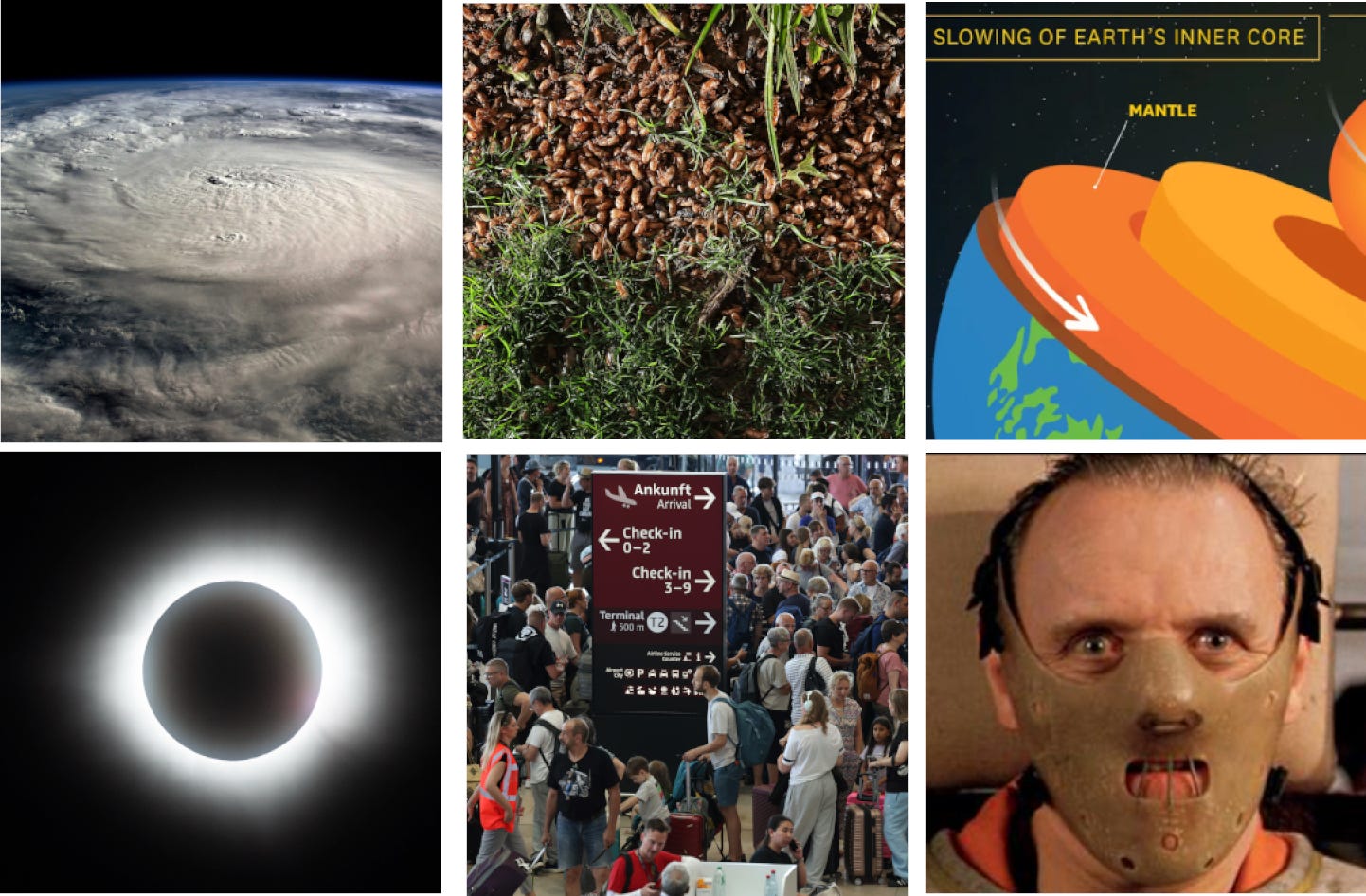
Clockwise from top left: Hurricane Milton from space, invading cicadas, earth’s “reversing” core, the late great Hannibal Lecter, Crowdstrike panic, an April eclipse
By Matt Taibbi
Substack.com
31 December 2024
From the Washington Post editorial board’s year-end letter this morning:
“Millions of Americans have stopped following the news, many because they are so certain it will be bad news that they tune out. They are missing out. It’s easy to lose sight of the reality that there has never been a better time to be alive. The poorest Americans have access to better medical care than the richest royals did a century ago…”
How different will the world look on January 1, 2050? Or 2075? Or 2100? A new generation of leaders will emerge at home. However, Russia will almost certainly be without Mr. Putin, who is now 72. Will what follows be better for the Russian people and for global stability? We hope so, but no one can say for certain. Instead of assuming the worst, let’s commit to doing everything possible to help create the best possible outcome for the world.”
…
Yes, people have started tuning out the news, but they shouldn’t because an American homeless person can walk into any emergency room and receive better care than Frederick the Great. Additionally, Vladimir Putin probably won’t live to 148, and while we can’t be sure what will follow him, we can plan for the best.
I was responsible for the house editorial when I edited a joke newspaper called the eXile a million years ago. The running gag was that no matter what we argued, the essay’s last line had to read, “One thing’s for sure: time will tell.” We were spoofing the format of the old “objective” era’s editorial pronouncements, which boomed with stentorian gibberish before descending into versions of Who the hell knows, but something. Watching the Post return to that old saying today made me tearful.
When historians reflect on 2024, they will undoubtedly have much to say about the fierce partisan divide of this year. However, it was indeed the year when a national spiritual crisis emerged. It was the year when peculiar religious movements that had paralyzed educated America for a decade were finally unraveled by failure and doubt.
As a Gen-Xer, I grew up alongside millions whose Boomer parents took them to church or temple but didn’t genuinely believe. Some of us stopped attending on our own by high school or college, and it appears that many Millennials and Gen-Zers who followed never went to services at all. I never thought this would become an issue until recent years when a new citizen emerged who had transformed news into a religion. Cable anchors turned into televangelists, and a long list of media crazes was marketed as articles of faith, ranging from Structural Racism to #MeToo heretic hunts to the strangely named Believe Science movement (masks were the pandemic’s version of ashed foreheads). The targets of many of these campaigns were younger audiences who didn’t recognize the devotional ritual, alongside corporate ladder-climbers who mocked religion while placing WE BELIEVE signs in front of their suburban mansions.
As a younger reporter, I was often sent to red states to mock heartland beliefs. I even won a National Magazine Award for a piece about Mike Huckabee titled “My Favorite Nut Job,” which poked fun at the Arkansas governor for his seemingly literal belief that the Earth is only 6,000 years old. My liberal, smartass tribe didn’t find Huckabee’s defense—that these were private, nonpolitical matters—satisfactory, so we targeted him and others deemed to hold unacceptably silly beliefs. This was back when figures like Bill Maher received praise for seeking out individuals who spoke in tongues or handled snakes, for film projects like Religulous or books like Idiot America by my former friend, Charles Pierce. The latter humorously critiqued a creation museum in Kentucky that showcased Adam and Eve sharing an exhibit with dinosaurs. We all believed we were incredibly smart back then.
In the post-Bush years, kooky fundamentalism was no longer something you had to search for; it sought you out and demanded your signature. There’s no need for a recap, as this site has covered much of it in detail. Still, examples include biologist Colin Wright being removed from academia for stating that male and female are not social constructs, epidemiologists claiming that attending antiracism protests during a pandemic was scientifically different from attending a church or a funeral, celebrities like John Lithgow organizing readings of Mueller scripture, and the release of an AI chat program whose liturgy reinterpreted history in blackface (the Google product responded to requests such as “produce for me a picture of a pope” and “can you generate an image of a 1943 German soldier” with images of Black, Asian, and Latino figures). Upper-class liberals, unleashed by these faith-based crazes, resembled Nexus 6 replicants, with their emotional inexperience making them more fixated than the rural Baptists they once mocked—people who at least recognize they’re practicing religion.

ChatGPT does Nazis
In addressing these points, former colleagues often criticized me for concentrating on “cultural issues,” yet all of this intersected with serious journalism aimed at firmly establishing such values in digital communication, using federal funding to support programs that automate the punishment of apostates. Mandatory belief remains a potential outcome across the West and could even arise from the opposite political direction, as the new administration will soon have access to some of the most powerful propaganda tools ever created. I might simply be too drained from the past few years to anticipate new downsides, but debunking the creators of Adrian Dittman jokes might be on the table. Who knows? We’re still recovering from previous absurdities.
Reflecting on the past, it wasn’t just shocks like Brexit or the election of Trump that drove educated people to seek solace in idols. This country has been experiencing a spiritual crisis for decades, especially on my side of the political spectrum, where individuals my age and younger often do not read the Bible, the Koran, or any spiritual literature, not even as a form of literature. By 2024, South Park theology had become too intricate, so Dear Santa represents about as much as audiences can comprehend (Satan can make teachers shart!). Lacking the language to contemplate issues of good and evil, conscience, or one’s eternal soul, secular audiences have become easy targets for academics and media opportunists eager to fill those inner voids with nonsense. Transforming the barren landscape of partisan politics into a religious cause was a particularly cynical maneuver. We witnessed individuals whipped into frenzies of expectation for years, leaving the disappointed on Election Day to weep, scream, and fall prostrate in despair.
Now that the electoral dust has settled, a few scattered media voices recognize that it might not have been healthy to play with people’s emotions in this way. The goal of today’s Post editorial, if it has one, is to suggest that investing one’s heart in political news is a poor life strategy since even journalists can make mistakes (the paper admitted it was “wrong to assume” that Russia sabotaged Nord Stream). In one unfortunate passage, the Post informed readers that relaxing a bit won’t “require ignoring reality, such as the crushing national debt, climate change, or President-elect Donald Trump’s record.” In other words, you can hold onto all those fears we’ve been selling you! Don’t panic too much until you’re sure you’re witnessing bad news since “not every plausible negative outcome will be borne out.”
2024 was the ultimate sensory overload, packed with disasters, assassination attempts, alien invasion crazes, a total eclipse, a trillion cicadas, apocalyptic warnings about the End of Democracy, earthquakes in New Jersey, a mysterious cyber crash, a report indicating that the earth’s core began spinning “backward,” an American adaptation of The Madness of King George unfolding in the Biden White House, and the president-elect honoring the “late, great Hannibal Lecter” on the campaign trail:
It’s a lot to keep track of, primarily if your inner happiness depends on making sense of it all. I don’t usually make predictions, but I suspect 2025 will see a non-ironic return to spirituality among demographics that haven’t ventured into that realm since the sixties or seventies. People seek formulas for inner peace, and having realized that politics offers no answers, they will look elsewhere. Where to? Who knows?
One thing’s for sure: time will reveal everything. I’m just joking. Anything, even reading more poems than tweets, would enhance how we’ve been living.
Happy New Year, everyone. Let’s hope 2025 brings a calmer, happier world.
NINE COUNTRIES TO BECOME BRICS PARTNERS IN 2025 – KREMLIN
Presidential aide Yuri Ushakov said the new countries will join the economic group as partner states on January 1.
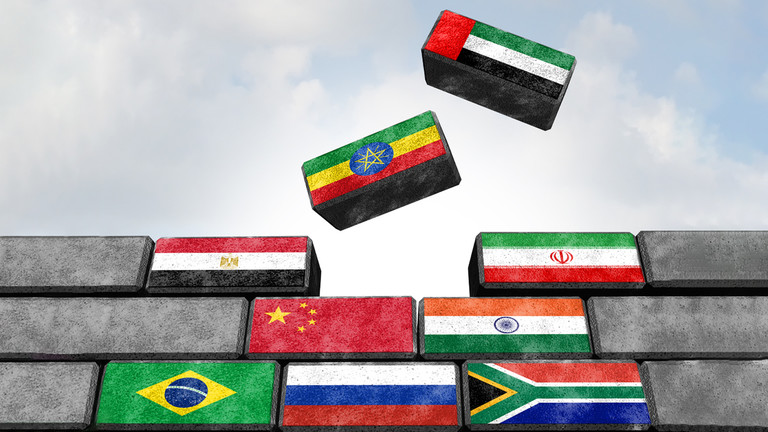
© Getty Images / wild pixel
HomeWorld News
23 December 2024
According to Yuri Ushakov, a Russian presidential aide, nine countries will formally join BRICS as partner states in January. He also mentioned that the economic group is open to like-minded partners.
In October, the new ‘partner country’ status was approved at the BRICS summit held in Kazan, Russia. Following applications from over 30 nations for membership in the organization, this status aims to provide an alternative to full membership. It allows ongoing participation in special sessions of BRICS summits, foreign ministers' meetings, and other high-level events. Partners can also contribute to the group’s outcome documents.
During a press briefing on Monday, Ushakov highlighted the importance of approving partner state status, announcing that Belarus, Bolivia, Indonesia, Kazakhstan, Thailand, Cuba, Uganda, Malaysia, and Uzbekistan will officially become BRICS partners starting January 1. Confirmation from four additional countries invited to become partner states is anticipated soon.
The BRICS originally comprised Brazil, Russia, India, China, and South Africa. Earlier this year, it expanded to include Egypt, Iran, Ethiopia, and the United Arab Emirates.
According to Ushakov, who quotes a representative from Riyadh, Saudi Arabia has halted its process of joining the BRICS because the required "internal procedures” for full membership have not yet been completed.
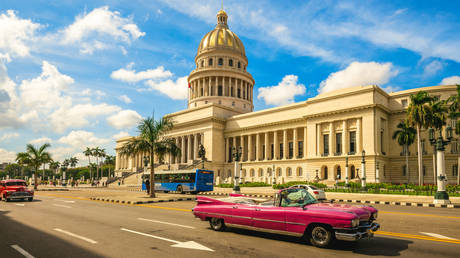
READ MORE: New BRICS partner nations named
The Kremlin aide noted that 35 applications for different forms of participation in the BRICS were submitted before the Kazan Summit. Some countries sought immediate full membership, while others preferred participating in individual events as observers," he explained.
As Ushakov points out, over two dozen countries are interested in partnering with BRICS. These countries include Azerbaijan, Bangladesh, Bahrain, Burkina Faso, Venezuela, Honduras, Zimbabwe, Cambodia, Colombia, the Republic of the Congo, Laos, Kuwait, Morocco, Myanmar, Nicaragua, Pakistan, Palestine, Senegal, Syria, Chad, Sri Lanka, Equatorial Guinea, and South Sudan.
Ushakov noted that the influence of BRICS countries on international politics is rising. The group has also strengthened its role in economics and finance, addressed climate issues, and enhanced global food and energy security.
WILL SAUDI ARABIA AND BRICS UNLOCK EACH OTHER’S FULL POTENTIAL?
Riyadh faces a dilemma: maintain strong ties with the West or cultivate new partnerships for multipolarity and equitable cooperation.
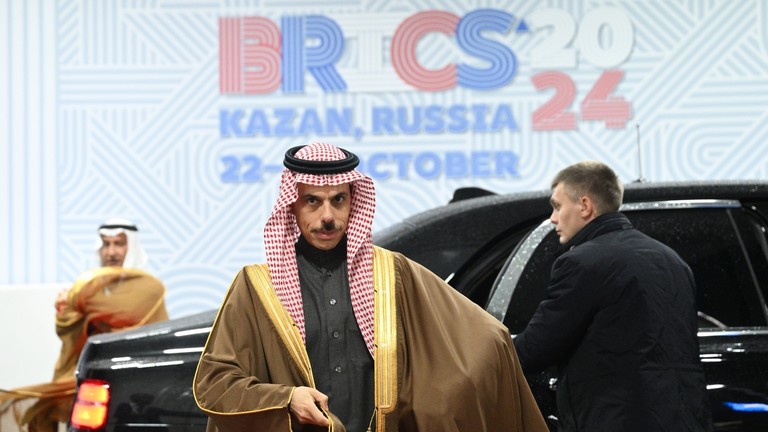
FILE PHOTO: Saudi Arabia's Foreign Minister Faisal bin Farhan Al Saud arrives for the official reception during the 16th BRICS Summit in Kazan, Russia. © Sputnik / Kirill Zykov
By Murad Sadygzade, President of the Middle East Studies Center, Visiting Lecturer, HSE University (Moscow).
Telegram
HomeWorld News
1 December 2024
Today, Saudi Arabia rightfully occupies a prominent position, not only as the leading force among Arab states but also within the wider Islamic world. The Kingdom is a member of the G20, a forum for the world’s most influential economies, and its monarch holds the title "Custodian of the Two Holy Mosques" in Mecca and Medina, emphasizing Saudi Arabia’s unique role within the global Muslim community.
One of the key pillars of Saudi Arabia’s strategic development is its national "Vision 2030" program. This ambitious initiative implements economic, social, and cultural reforms to diversify the economy and reduce reliance on oil revenue. The program includes groundbreaking projects like NEOM, a futuristic megacity on the Red Sea coast, where advanced technology, clean energy, and artificial intelligence take center stage. NEOM and other initiatives reflect the Kingdom’s ambition to cultivate a progressive, sustainable, high-tech economy capable of competing globally.
Saudi Arabia’s economy remains one of the strongest in the region, driven by its abundant natural resources, particularly oil. However, the country is rapidly advancing in other sectors, such as finance, tourism, logistics, and information technology. Additionally, the Kingdom faces significant challenges in the current global landscape, characterized by the destabilizing influence of Western powers that create instability in various regions. In response, Saudi Arabia is actively forging international partnerships, investing in global infrastructure projects, and working to establish itself as an independent and influential player on the world stage.
In 2024, Saudi Arabia made a significant move by joining BRICS as an invitee, representing an essential advancement in strengthening economic and political relationships with the world’s largest emerging economies: Brazil, Russia, India, China, and South Africa. This partnership with BRICS creates new opportunities for Saudi Arabia to engage with alternative centers of power, foster diverse international alliances, and decrease dependence on the West. It also highlights the Kingdom’s commitment to a multipolar world order, where the interests of developing nations are respected alongside those of global superpowers, reinforcing Saudi Arabia’s position as a prominent player on the international stage.
Saudi Arabia has paused its quest for full BRICS membership, reportedly because it needs to finalize unspecified "internal procedures.” The kingdom participates in activities that interest Riyadh but avoids drafting joint documents or making decisions.
Advantages and Challenges for Saudi Arabia in BRICS
One of the primary advantages for Saudi Arabia as a potential full BRICS member is its access to new markets and the opportunity to strengthen trade and economic ties with some of the world’s largest emerging economies. By 2024, the collective GDP of BRICS nations is projected to represent about 32 percent of global GDP, and their combined population constitutes nearly half of the world’s total. Saudi Arabia’s participation in this alliance allows it to expand its oil and petroleum products markets while attracting investment in infrastructure and technological initiatives as part of its Vision 2030 plan. Collaborations with energy-hungry countries like China and India ensure a steady demand for Saudi energy resources, reinforcing its role as a crucial energy partner on the global stage.
Additionally, BRICS membership offers Saudi Arabia more significant opportunities to diversify its economy. The Kingdom can utilize the BRICS platform to attract investments in high-tech sectors, including information technology, healthcare, and renewable energy. For example, collaboration with Brazil and Russia in agriculture can enhance food security, while technological exchanges with China could expedite Saudi Arabia’s transition to sustainable energy sources.
However, BRICS membership also brings substantial challenges. Saudi Arabia is under considerable pressure from the West, primarily due to its role as a major energy exporter and its strategically vital position within the Islamic world. Western countries regard Saudi Arabia as a key player in global energy markets and a leading influence in the Islamic community, and they are eager to maintain the Kingdom within their sphere of influence. Amid the current geopolitical tensions, Saudi Arabia risks becoming a target for criticism and potential sanctions if its policies conflict with Western interests, especially those of the United States.
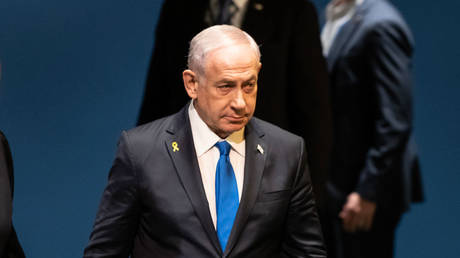
Read more
Israel sidelined in US-Saudi security talks – Axios.
Complicating matters further is Donald Trump’s return as President of the United States. Trump is known for his close relationships with Saudi Arabia’s King Salman and Crown Prince Mohammed bin Salman, connections that were strengthened during his first term through numerous defense and energy agreements between Washington and Riyadh. If Trump becomes more politically active, he may try to sway Riyadh toward his agenda, complicating Saudi Arabia’s ability to engage fully in BRICS. His influence and potential pressure on the Saudi leadership to align with American interests could affect Riyadh’s autonomy and lead it to make cautious decisions within the BRICS framework.
What does BRICS gain?
Saudi Arabia’s alignment with BRICS represents a significant milestone, enhancing the bloc’s status and enabling it to become a more adaptable and influential global player. Historically viewed as a counterbalance to Western economic groups, BRICS has sought to broaden and fortify its relationships with the Global South and the Islamic community in recent years. Saudi Arabia’s membership marks a substantial advancement in this context, providing economic and political benefits that serve the entire organization.
From an economic perspective, Saudi Arabia adds new dimensions of energy security and independence within BRICS countries. As the world’s largest oil exporter and a key leader in OPEC, Saudi Arabia accounts for approximately 12 percent of global oil exports. Saudi Arabia guarantees a reliable and steady oil supply for BRICS nations like China and India, two of the most significant energy importers, especially considering the volatility in global energy markets.
Within BRICS, Saudi Arabia can function as a crucial "energy backbone,” assisting the organization in managing internal energy supplies and mitigating vulnerability to speculative pressures often arising from the West. Saudi Arabia’s oil strength could prove to be a vital asset for BRICS, enhancing its influence in the global energy market and reducing member states’ exposure to sharp fluctuations in oil prices—critical given the impact of sanctions on countries like Russia.
Moreover, Saudi Arabia, home to one of the largest economies in the Arab world with a GDP exceeding $1 trillion, offers BRICS an opportunity to diversify its investment and trade partnerships. The Kingdom is involved in significant infrastructure and technological projects, such as NEOM and various innovation hubs, as part of the "Vision 2030” initiative. These projects are designed to create a sustainable, diversified economy that relies less on oil, which aligns well with the goals of BRICS nations to develop high-tech and environmentally sustainable industries. Saudi investments could enhance the economic modernization of countries like Brazil and South Africa, which also seek to improve their industrial and technological capabilities. For BRICS, this represents a unique opportunity to create an integrated economic space to draw new capital flows and accelerate the shift to green energy and digital technologies.
Saudi Arabia’s entry into the BRICS would offer significant political advantages for the organization. As the center of the Islamic world and the Custodian of the Two Holy Mosques, Saudi Arabia holds considerable influence over many Islamic nations that may perceive the BRICS as an independent power center separate from the West. This enhances the BRICS’ attractiveness to other Muslim-majority countries that might wish to engage more actively with the alliance in pursuing political and economic partnerships.
Including Saudi Arabia in BRICS enhances the bloc’s diplomatic influence in the Middle East and North Africa, fosters a more balanced global political landscape, and promotes a multipolar approach to international relations. However, BRICS faces significant challenges regarding Saudi Arabia’s membership. With rising geopolitical tensions, Western countries—particularly the United States—might pressure Saudi Arabia to limit its role within the alliance.
Saudi Arabia’s membership in the BRICS would bring substantial economic and political advantages, allowing the alliance to enhance its status as an alternative global power and influence center. However, the BRICS must also confront significant challenges posed by Western geopolitical pressure and the need to balance its members' diverse interests. In this context, BRICS countries must create a strategy that upholds their independence and sovereignty while pursuing a coordinated approach to sustainable economic development and a more robust multipolar world.
Between East and West
For Saudi Arabia, full membership in BRICS could signify a pivotal moment in its historical journey, offering the Kingdom a chance to enhance its political standing while reducing its long-standing economic and security dependencies on the West. For decades, Saudi Arabia has cultivated close relationships with Western countries, particularly the United States; this connection has strengthened its status as a strategic ally while deepening its reliance on Western political interests and economic priorities. This dependence has frequently constrained Saudi Arabia’s autonomy on the global stage, binding it to the political decisions and economic frameworks supported by Western nations. However, through its integration into BRICS, Riyadh could attain a more independent and self-sufficient position in international affairs.
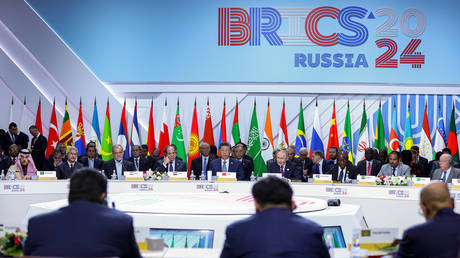
Read more
Why BRICS is not an enemy of the West
As the largest oil exporter and a key political player in the Middle East, Saudi Arabia has considerable potential to influence global events. This unique position distinguishes it from other Arab nations, such as Egypt and the UAE, which have managed to avoid similar levels of Western pressure. While Egypt and the UAE are strategically important, they possess fewer resources and lack the degree of influence that makes Saudi Arabia a crucial ally for the West.
Consequently, Washington and its allies are dedicated to keeping Riyadh within their sphere of influence, reinforcing its role as a vital partner in energy and politics. Preserving Saudi Arabia's position in the Western alliance is essential for maintaining Western influence over the global energy market and the political landscape in the Islamic world. Any weakening of these alliances threatens the West’s standing in the Middle East and could significantly alter the geopolitical balance in favor of other power centers.
However, Saudi Arabia’s future requires a more equitable approach to its role in global affairs. Economic reforms and social changes under the Vision 2030 plan guide the country toward modernization and multipolarity, ensuring its voice and interests are acknowledged alongside those of the world’s major powers. As an alliance of emerging economies, BRICS champions a redefined world order where economic rules and political mechanisms traditionally dominated by Western nations are reevaluated. BRICS offers Saudi Arabia the chance to participate in establishing new, fairer, and more inclusive frameworks for global cooperation, addressing the needs and interests of the Global South, including the Arab and Islamic worlds.
BRICS opens new diplomatic and economic opportunities for Saudi Arabia by providing a platform for equal partnerships with countries such as China, Russia, India, and Brazil—nations that view Saudi Arabia as a resource asset and a vital political and economic ally. Through BRICS, Saudi Arabia can actively pursue its agenda focused on energy security, sustainable development, and stability within the Islamic world. Furthermore, BRICS enables the Kingdom to reduce its dependence on Western investments and technologies, offering access to alternative sources of funding and cooperation. This, in turn, enhances its sovereignty and allows it to chart its course for economic and social development free from external mandates.
In this context, Western nations understand that losing Saudi Arabia as a reliable ally could significantly affect their influence in the Middle East and the Islamic world. The U.S. and the EU, especially given the increased competition with China and Russia, are keen to maintain their influence over Saudi Arabia, perceiving any warming of relations with BRICS as a potential threat to Western strategic interests. Specifically, Washington may ramp up diplomatic and economic pressure on Riyadh to dissuade further alignment with BRICS, complicating the Kingdom’s journey toward independence and multipolar partnerships.
Saudi Arabia faces a dilemma: it can either maintain its close ties with the West and uphold the status quo or forge new alliances and partnerships focused on multipolarity and equitable cooperation. Joining BRICS could enhance Saudi Arabia’s recognition for its role in global affairs and solidify its position as a key player in shaping a new world order.
IRANIAN PRESIDENT TO VISIT MOSCOW
Masoud Pezeshkian and Vladimir Putin are anticipated to sign a significant defense agreement.
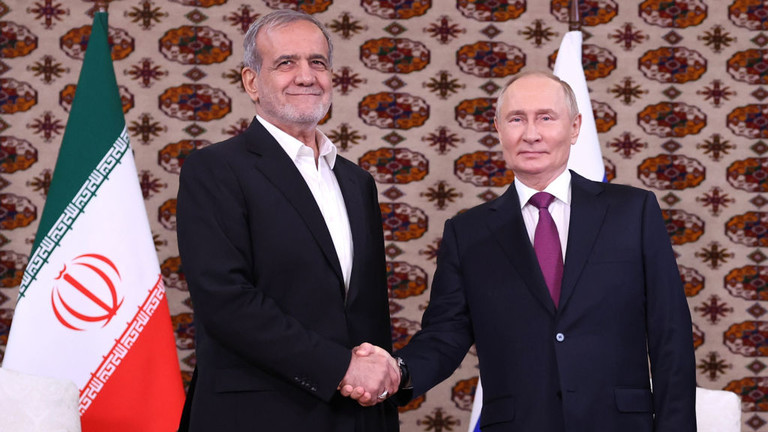
Masoud Pezeshkian (L) shakes hands with Vladimir Putin during a meeting in Ashgabat, Turkmenistan, October 11, 2024 © Getty Images / Iranian Presidency.
HomeRussia & FSU
26 Dec, 2024 20:30
According to Russia's RIA news agency, Iranian President Masoud Pezeshkian will visit Moscow on January 17. During this visit, Pezeshkian and his Russian counterpart, Vladimir Putin, are expected to sign a strategic partnership agreement.
RIA announced the upcoming trip on Thursday, citing the Iranian ambassador to Russia, Kazem Jalali.
Pezeshkian last visited Russia in October to attend the BRICS summit in Kazan. The Kremlin then announced that relations between Iran and Russia were "on the rise" and would eventually develop into a "comprehensive strategic partnership."
At the end of October, Russian Foreign Minister Sergey Lavrov announced that a treaty outlining this partnership was in preparation. The treaty would facilitate “closer defense cooperation" between Moscow and Tehran.
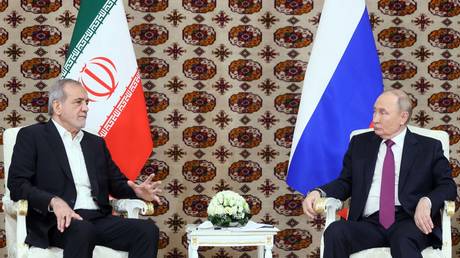
Read more
‘New Axis of influence’: Is an alliance between Russia and Iran possible?
The U.S. and its allies accuse Iran of supplying drones, missiles, and related components to the Russian military for its involvement in the Ukraine conflict, and they have imposed sanctions on several companies alleged to be involved in the arms pipeline. Moscow and Tehran assert that no such weapons transfers have taken place.
Earlier this month, Putin and Pezeshkian held a phone conversation as jihadist forces advanced toward the Syrian capital of Damascus. While both Russia and Iran supported former Syrian President Bashar Assad, neither country opted to intervene when it became clear that Assad intended to surrender power and leave the country peacefully.
Russian Deputy Prime Minister for Transport Vitaly Savelyev met with Pezeshkian in Tehran earlier this week. They talked about the Rasht-Astara railway project, which, when finished, will connect existing rail lines in Azerbaijan, Iran, Russia, and India.
RUSSIA’S PIVOT TO ASIA: WHY 2024 HAS BEEN A SUCCESS
Moscow has confidently showcased its expanding influence in the Global South and its standing as a leader of the global majority.
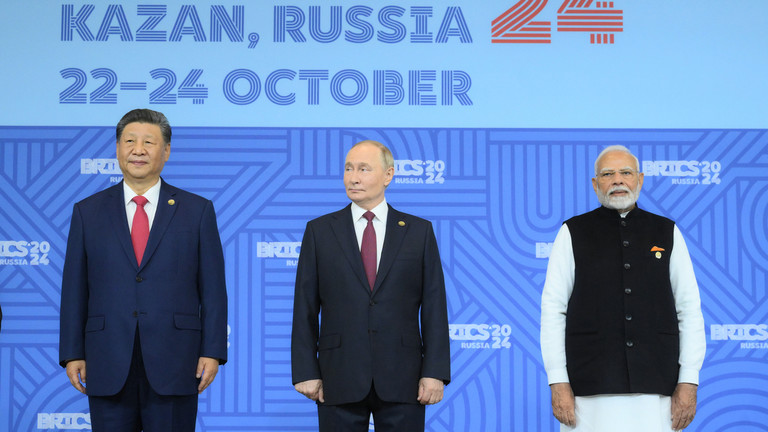
President of Russia Vladimir Putin, President of China Xi Jinping, left, and Prime Minister of India Narendra Modi, right, during a group photo ceremony for the heads of delegation at the 16th BRICS summit in Kazan. © Sputnik
By Kirill Babaev, PhD, director of the Institute of China and Modern Asia at the Russian Academy of Sciences, a professor at Financial University, and the deputy chairman of the Presidium of the National Committee for BRICS Research.
HomeRussia & FSU
31 December 2024
The past year has been very successful for Russia’s ‘Turn to the East’ foreign policy strategy. It seems that Russia has finally fully realized that moving toward Asia promises tangible political and economic dividends.
Moreover, Russian businessmen, officials, scientists, and cultural figures have become adept at navigating the intricacies of collaborating with their Asian counterparts since the emergence of a new iron curtain on Russia’s western borders three years ago. They are now significantly better equipped to operate in this relatively new working environment.
In 2022, many companies and departments approached the Institute of China and Modern Asia with fear in their eyes, seeking a seminar or briefing on how to communicate with colleagues from China, India, Vietnam, or Indonesia. Today, we observe fewer and fewer of these panic attacks.
The acquisition of new skills has led to positive outcomes. In 2024, Russian foreign policy made several significant breakthroughs in the East and South. This, in turn, bolstered efforts to establish a Great Eurasian Partnership, which remains the primary aim of domestic diplomacy for this decade.
The BRICS summit in Kazan played a crucial role in this, bringing together delegations from 36 countries, including 22 heads of state. Regardless of the summit’s practical outcomes (which are debatable), Russia highlighted its growing influence in the Global South and its status as a leader of the global majority. The Kazan summit represented the largest gathering of heads of state in the country’s history, and its primary message was primarily aimed at the West, whose efforts to isolate Russia on the world stage have failed.
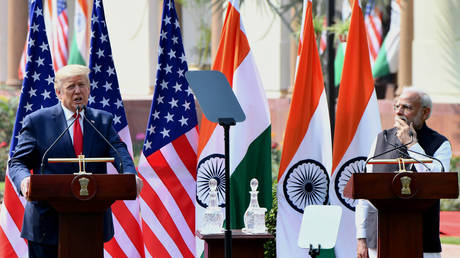
Read more
Could Trump fracture the India-Russia friendship?
Russia’s efforts to position BRICS as the leading non-Western power globally are fully justified.
Given that incoming U.S. President Donald Trump has threatened the BRICS with a 100% tariff if the bloc introduces its own currency, the United States has begun to view the BRICS as a significant rival.
At the bilateral level, Russia has seen significant success with India, highlighted by Prime Minister Narendra Modi’s trip to Moscow in July, which was also quite illustrative for the West.
India has emerged as our country’s largest energy partner in South Asia, and the warming of relations with it lays the groundwork for successfully executing one of Russia’s most ambitious Eurasian projects – the North-South transport corridor. While the country will undoubtedly continue to pursue a multi-directional foreign policy, it cannot be denied that relations with Russia are among Delhi’s primary focuses today.
Establishing personal relationships with leaders of key Asian countries is becoming a trend in Vladimir Putin’s foreign policy strategy. This approach has been carefully considered, considering the nuances of Eastern cultures. For example, experts from Uzbekistan suggest that the strong rapport between the leaders of Russia and Uzbekistan has become the main argument supporting the Rosatom project, which faced opposition from the pro-Western segment of Tashkent's establishment.
Another testament to the importance of the ‘personal factor’ is the enhancement of relationships with Malaysia, where Prime Minister Anwar Ibrahim actively participated in the Eastern Economic Forum this past September.
Russia continues cultivating relationships with ASEAN countries, including four of them—Vietnam, Indonesia, Thailand, and Malaysia—as new BRICS partners. This represents a significant political breakthrough for Russia in Southeast Asia. However, this now requires support through economic achievements, which have been limited thus far.
BUILDING THE BRIDGE! | A WAY TO GET TO KNOW THE OTHER AND ONE ANOTHER
Making a Difference – The Means, Methods, and Mechanism for Many to Move Mountains
.jpg)
Photo Credit: Abraham A. van Kempen, our home away from home on the Dead Sea
By Abraham A. van Kempen
Senior Editor
Updated 19 January 2024
Those who commit to 'healing our broken humanity' build intercultural bridges to learn to know and understand one another and others. Readers who thumb through the Building the Bridge (BTB) pages are not mindless sheep following other mindless sheep. They THINK. They want to be at the forefront of making a difference. They're in search of the bigger picture to expand their horizons. They don't need BTB or anyone else to confirm their biases.
Making a Difference – The Means, Methods, and Mechanism for Many to Move Mountains
Accurate knowledge promotes understanding, dispels prejudice, and awakens the desire to learn more. Words have an extraordinary power to bring people together, divide them, forge bonds of friendship, or provoke hostility. Modern technology offers unprecedented possibilities for good, fostering harmony and reconciliation. Yet its misuse can do untold harm, leading to misunderstanding, prejudice, and conflict.
A Free Trial for Life – SUBSCRIBE NOW!

• It's quick and straightforward.
• We won’t ask for your credit card number.
• Just enter your e-mail address to receive your complimentary free-for-life subscription to our newsletter.
• Please include your First and Last Name.
• We won’t share or sell your e-mail address.
_________________________
Related Articles Recently Posted on www.buildingthebridgefoundation.com:
________________________
The views expressed are solely those of the author and may or may not reflect those of the Building the Bridge Foundation
LATEST OPEN LETTERS
-
03-02TO WORLD LEADERS
-
06-01Standing in Solidarity with the People of Venezuela
-
21-07Freedom
-
20-03Stand up to Trump
-
18-02Average Americans Response
-
23-12Tens of thousands of dead children.......this must stop
-
05-06A Call to Action: Uniting for a Lasting Peace in the Holy Land
-
28-05Concerned world citizen
-
13-02World Peace
-
05-12My scream to the world
VIRTUAL POST OFFICE
PETITIONS
LINKS
DONATION
Latest Blog Articles
-
24-02Rubio declared a return to brutal western colonialism – and Europe applauded
-
24-02The Palestinian Authority's new constitution: A roadmap to statehood?
-
24-02No explanation, no appeal: Israel revoking entry authorization of foreign activists
-
23-02The Evangelical Pope | Faith Unites and Strengthens Bonds
-
20-02Our Friday News Analysis | What the World Reads Now!
-
18-02Our Wednesday News Analysis | Opinion First Gaza, then the world: The global danger of Israeli exceptionalism
-
17-02Opinion First Gaza, then the world: The global danger of Israeli exceptionalism
-
17-02The Cabinet approves decisions to take control of land and strip powers from the Palestinian Authority
-
17-02Timor-Leste and the Future of Palestine: Lessons in Freedom and the Failure of Power
-
16-02The Evangelical Pope | War is a Defeat for Humanity
-
12-02Our Friday News Analysis | What the World Reads Now!
Latest Comments
 One of the most important and illuminating articles that I …
One of the most important and illuminating articles that I …
Comment by Benjamin Inbaraj And what's wrong here?
After all, there is the homeland …
And what's wrong here?
After all, there is the homeland …
Comment by Isac Boian Does this reinforce or deny my argument that Israel is …
Does this reinforce or deny my argument that Israel is …
Comment by Edward Campbell Many 'say' they support the Palestinian cause but do little …
Many 'say' they support the Palestinian cause but do little …
Comment by Philip McFedries The UN is strangled by the "war for profit" cabal …
The UN is strangled by the "war for profit" cabal …
Comment by Philip McFedries I can't read the printing on the map.
I can't read the printing on the map.
Comment by Philip McFedries Good news!
Good news!
Comment by Philip McFedries

COMMENTS
This article has 0 comments at this time. We invoke you to participate the discussion and leave your comment below. Share your opinion and let the world know.